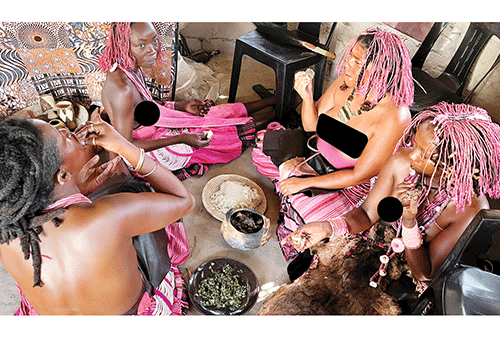OMUNYEKADI – Ticking off an item on her long list of goals, Unam lecturer Ndapewa Nakanyete, a PhD holder in Geography, recently participated in a traditional wedding known in Oshiwambo as Efundula lomeengoma, at the Omunyekadi village in the Ohangwena region.
She was part of four women, including a Nigerian and an Egyptian, who partook in the ceremony.
Efundula lomeengoma symbolises a ceremonial ritual process, essentially translated as a wedding through the beats of drums. Within this tradition, female youths, known as Ovafuko, collectively experience a passage into womanhood, following Ovawambo (Ovakwanyama) customs.
This passage includes undertaking tests related to the social obligations of womanhood, receiving education on cultural values and delving into spiritual (and even psychological) development.
Efundula serves as both a rite of passage and a transition ceremony, occurring before participants can consider acquiring a partner or husband, or simply before being openly accepted as sexually active.
Asked what motivated her to take part in Efundula, Nakanyete said it stems from a longstanding desire, rooted in her childhood experiences.
“Raised in a village where Efundula ceremonies were significant cultural events, I attended them numerous times, despite objections from my Christian family. I would sneak out of the house at night or pass by to briefly watch from school before heading home. I was captivated by
the Ovafuko, particularly by the way they dressed, their rhythmic dances to the beat of drums throughout the night – and then when, the day after the night of dancing, they assumed the role of “oihanangolo” or warriors. “During this phase, they asserted themselves as people who could freely acquire anything they wished for, including food or even capture animals (chickens or goats) from men’s households.
“Oihanangolo could also mock and beat every man they encountered, which is a combination of engaging in playful and serious encounters,” she narrated.
Nakanyete further emphasised that as an adult exposed to diverse cultures, including western influences, and who is aware of how colonialism and evangelism have almost completely transformed their cultures, she has come to appreciate and understand the merits of various traditional practices, Efundula being one of them.
In addition, she said, despite the passing of the healers who led Efundula in her childhood village in the early 2000s, her joy was rekindled in 2014 upon discovering the existence of Ovakwanyama’s Efundula. So, she made a personal commitment to participate one day as Omufuko.
“During my PhD studies, I set a goal to undergo it upon completion, serving as a powerful motivator to swiftly finish my academic journey. This year, I fulfilled that promise, participating in Efundula as a culmination of my longstanding aspiration,” she beamed.
Nakanyete said she is not seeking a husband.
“Acquiring a husband is not the primary purpose of Efundula. If I were seeking a partner, there are various other avenues available for me to pursue. Efundula is a multifaceted ceremonial ritual, encompassing various phases, including the rite of passage from girlhood to womanhood, guidance from elders, especially women, who impart knowledge of traditions, social obligations, cultural
values as well as a spiritual journey,” she emphasised.
Nakanyete added it is only during one of the final phases of Efundula that one might encounter a potential admirer or, if already in a relationship, their partner, who signifies their desire to marry by placing a bracelet on your wrist.
However, it is important to note that you have the right to remove the bracelet if you are not interested in being with or marrying that person.
Questioned how she felt during and after her participation in Efundula, she said, “Participating in Efundula was a profoundly empowering and fulfilling experience for me.
The positive intensity of the entire process left a deep impact, and I am currently in the process of soaking in and digesting all that transpired. It will take some time before I can fully articulate and provide the concise details you may seek. Overall, I am immensely grateful and proud that I undertook this journey. I can confidently share with others that Onda fukala (I have participated in efudundula).
She obtained a Bachelor of Arts degree in Geography and Sociology from the University of Namibia, and earned a Master’s degree in Geographic Information Technologies from the Autonomous University of Barcelona in Spain, as well as a Master of Arts degree in Culture and Environment in Africa from the University of Cologne (Germany).
Meanwhile, Ade from Nigeria told New Era she was invited to partake in efundula by her friend Ndapewa.
She noted that she is not “looking for husbands in Namibia, but rather a deeper understanding of the importance of the cultural ritual in the fabric of local indigenous communities”.
– fhamalwa@nepc.com.na



